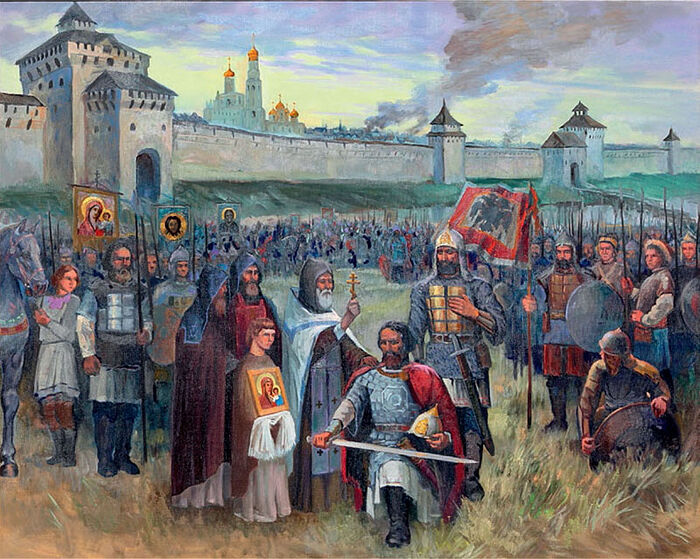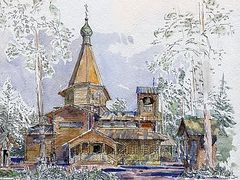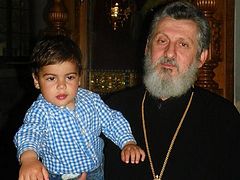Nothing and no one on earth can live without water, be it from a lake, a river, rainwater, or a spring. Needed by everything under the sun, nevertheless, not all water is the same. Sometimes God gives a spring healing powers, and then that water not only nourishes but renews strength and restores health. These healing springs and streams can be hot, they can have a specific flavor, color, and chemistry. Animals finds these waters through instinct, people by their minds, and along with them they gain the Creator’s mercy. Why some springs are ordinary while others are miracle-working, is only known to the One Who created heaven and the earth and all that is therein.
It’s the same with icons. There are many of them. In churches and homes, small and large, ancient and new, they look at us through the eyes of Christ, the Mother of God, and the holy God-pleasers. And through some of them, God deigns to work miracles and manifest His mercy. Thus did He decide, and it is He Himself who chooses. Why this icon and not another one, and why now and not earlier or later is also His will. Such an icon is the Kazan icon.
Its veneration links us with personalities and events. The main personality is Patriarch Hermogenes, the defender of Russia and a martyr. While yet an ordinary priest, he became a witness to the miracles wrought through the newly revealed icon. He recorded these miracles and became the composer of the troparion to the Mother of God: O earnest helper, Mother of the Lord Most High, thou does entreat Christ, they Son and our God, in behalf of all, and causest all to be saved who have recourse to thy mighty protection…
And the main event was the Time of Troubles. It can’t be compared with anything, except perhaps with the 1917 revolution and the string of nightmares that followed. Habitually complaining about life and expressing our dissatisfaction with everything in the world, we can hardly imagine that turmoil between dynasties, when the Rurikids were cut off, and the Romanovs had not yet appeared; when an enormous country fell like a wounded beast into the teeth of countless jackals. And jackals know no pity.
Then the peasant doesn’t work the land, because he knows his harvest will be stolen from him anyway. The merchant does not go out to sell because he knows he’ll be robbed. The villages become desolate and the rooftops of abandoned houses hang ajar. There is no one for the dogs to bark at in vacant hamlets and villages. Rulers turn around so rapidly that the people don’t even have time to remember their names. Kissing the cross in loyalty is one, then another, then a third, and people completely cease to sense the sanctity of the oath and the kissing of the cross. All is profaned and everything loses its value. Life becomes a toy, and no one buries the forsaken corpses. The first to be corrupted are those closest to the authorities, who are sunk in intrigues. Those who sit on two chairs and dream of crowns, but tremble for their own skins. They become cynics, and the defenseless people no longer trust anyone. And now the puppets of the Polish king are wearing the crown of Monomakh, and in the Kremlin they are singing the Liturgy in Latin.
The end of the Time of Troubles was miraculous and unpredictable. The people organized themselves, became inspired, and forming an army they went to free the White Stone House of the Mother of God. The leaders were entirely unexpected, just as unexpected as David, the conqueror of Goliath. The image of the Mother of God on icons and banners went before the people’s army.
To St. Hermogenes, who was dying of hunger in the monastery cellar, appeared saints, amongst whom was Abba Sergius of Radonezh; they told him that through the intercessions of the Mother of God the judgment upon the Fatherland has been changed to mercy.
Here we have a kind of answer to our frequent questions and perplexities. After all, there is involuntarily servitude in foreign lands, there is the weariness of the laborer, there are empty villages. There is the cynicism of the powers that be, who hate the country they rule, and are ready if necessary to listen to different church services in an unknown language. (That’s if it’s necessary—but if not, better to go without services altogether.)
But there is the Mother of God. There is the people’s love for her. There is also her prayer to her Son, as once in Cana of Galilee. There she said, “They have no wine.” Now she probably says, “They have lost their minds. They have no willpower. They have no love. Their faith is weak.” And just as then the water became delicious wine after Mary’s request, so today, nothing hinders the Lord from turning cowardice into bravery, petty egoism into gratitude, and stupidity into wisdom.
That is, of course, she prays.
That is, of course, if we ask her to pray.
***
Come, ye people named after Christ, to the pure wellspring and draw and drink healing water freely. This is not water from the tap, but a healing spring, which began to flow and does not cease to flow, according to God’s will.
Grant things profitable unto all, O Virgin Theotokos, and save us all, for thou art the divine protection of thy servants.




